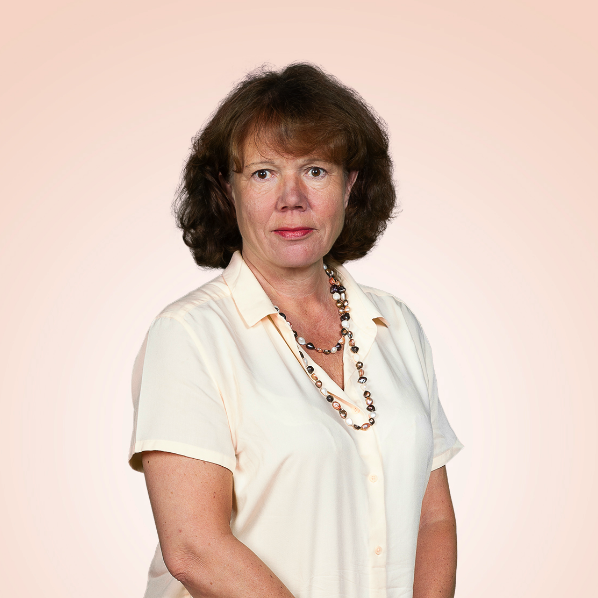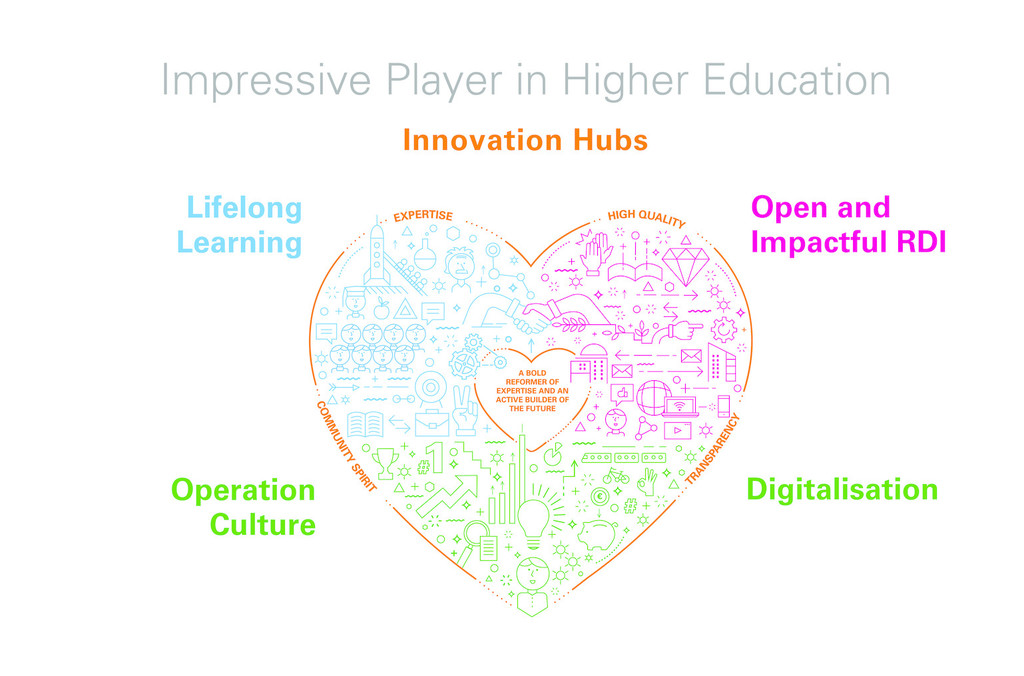President and CEO’s review 2019: Becoming an influencer UAS through bold renewal
 The year 2019 was a time of growth and renewal for us. We continued our ambitious reforms and put more and more resources throughout the year into increasing our social influence. Our goal-oriented actions resulted in strong growth and an excellent result for the financial year.
The year 2019 was a time of growth and renewal for us. We continued our ambitious reforms and put more and more resources throughout the year into increasing our social influence. Our goal-oriented actions resulted in strong growth and an excellent result for the financial year.
Metropolia aims to be a bold reformer of expertise and an active builder of the future.
Our key strategic themes were:
- Continuous learning
- Innovation hubs
- Skilled and motivated staff.
Some of the keys to our success were active development and implementation of degree studies and other learning solutions as well as the consolidation of the activities of our phenomenon-based innovation hubs.
Continuous learning and competence tracks
In 2019, Metropolia focused on revising the curricula of all its degree programmes and on identifying and developing factors that impact the quality of learning.
During the year, Metropolia students completed 2,794 UAS Bachelor’s degrees and a record-high 447 UAS Master’s degrees. The number of business degrees and technology degrees grew on the previous year, reaching a new record. Metropolia graduates have a higher-than-average rate of employment compared to their peers.
The framework for other learning solutions and the Metropolia Match® service model, which applies this framework in a concrete way, were completed in 2019. The service model offers flexible learning solutions for people with various life situations. Its customers include young and working-age people, as well as children in day care and older citizens.
Metropolia, Haaga-Helia and Laurea (3UAS) improved student mobility between the three UASs and developed new competence tracks that will reinforce the competence available in the Helsinki metropolitan area. In 2019, there were 12 joint competence tracks on offer and they were utilised by around 700 students.
Innovative solutions to address social challenges
Metropolia's decision to concentrate its research, development and innovation activities at five phenomenon-based innovation hubs has proven to be a success. The innovation hubs work with partners to seek new solutions to selected social phenomena and challenges.
The curriculum reform implemented in 2019 enables students to engage in phenomenon-based learning and participate in the RDI projects carried out at the innovation hubs, where students work and learn together with companies, city councils and other partners.
Metropolia developed collaboration platforms for the campuses where innovation activities, experiments, piloting and learning can take place. Helsinki XR Center (HXRC) on the Arabia campus is a collaboration platform that focuses on XR technologies, combining research and development, startup activities and corporate collaboration in the field. Metropolia operates HXRC together with the Finnish Virtual Reality Association FIVR. Other cooperation partners include the City of Helsinki and Business Finland. The first year of operation for HXRC was a success.
The Urban Farm Lab has been developed in cooperation with the Finnish Innovation Fund Sitra, the City of Vantaa and various businesses as a learning environment for creating scalable and modifiable future farming techniques and circular economy solutions based on them. The Urban Farm Lab has attracted widespread media attention in Finland and abroad as well as numerous visitors. In 2019, more than one hundred students from eight different degree programmes participated in the Urban Farm Lab’s activities.
Our staff enable the execution of our strategy
In 2019, Metropolia focused particularly on three human resources management themes: the development of the staff’s ability to deal with change, supervisory work and support for working communities.
Dialogue-based collaboration practices were furthered through CampusAcademy events held for the staff at the Arabia, Myllypuro and Myyrmäki campuses in September. The Osallistaen publication, which compiles competence and practices for increasing participation at Metropolia, was completed in 2019. The publication provides practical tools for utilising participatory methods and, at the same time, forms an interesting compilation of the numerous opportunities for new kinds of collaboration.
Peda meetings were held for the teaching staff with the aim of renewing their pedagogic competence. Peer mentoring groups intended for new employees were started at three campuses. The groups enhance peer learning, promote a community spirit and increase wellbeing at work.
Dialogue-based practices were added systematically to the Metropolia Academy, the meetings of the Management Group and the revised Manager Forum. Supervisory work was also supported with network meetings held at each campus, where the participants increased their understanding of an immediate supervisor's role in day-to-day work and shared best practices.
Operations concentrated at four campuses
Metropolia continued to concentrate its operations at its four campuses in Myllypuro and Arabia in Helsinki, Myyrmäki in Vantaa and Karamalmi in Espoo.
The construction work for the second phase of the Myllypuro campus was completed in October and furniture and equipment were installed there during the rest of the year. The Myllypuro campus was fully commissioned in January 2020. The construction of the second phase of the Arabia campus advanced to the building construction stage and the premises plans for the third phase were completed and made ready for implementation. The temporary teaching premises in Karamalmi were put into use in August, and the modification of these premises began in September. At the Myyrmäki campus, warranty repairs were carried out in the building extension, while the repairs to the ventilation in the laboratory wing in the old section were completed in September.
Active influencing through networks
Metropolia works actively through various networks, influencing social dialogue and solutions in numerous ways. Social influencing is also conducted in cooperation with other higher education institutions in the Helsinki metropolitan area and through Arene, the Rectors’ Conference of Finnish Universities of Applied Sciences.
Strategic cooperation was strengthened both in Finland and on the international stage. The strategic alliance between Metropolia, Haaga-Helia and Laurea was further intensified as the utilisation of the opportunities offered by artificial intelligence was introduced as a new joint activity. The UASs developed the competence tracks they offer jointly and increased funding applications in RDI activities. Cooperation within the international strategic partner network U!REKA was reinforced with the joint European Universities application.
Financial statements
Metropolia’s result for the 2019 financial year was excellent. The result was a profit of EUR 1.7 million, an increase of EUR 1.8 million on the previous year. The improved result was mainly due to growth in turnover and an increase in investment and financial income. At the end of 2019, Metropolia’s overall financial situation was good. Profitability improved on the previous year, liquidity and solvency remained good and the equity ratio was 71.2%.
- Turnover and other operational income totalled EUR 98.3 million, a growth of 2.2% on the previous year.
- Operating expenses amounted to EUR 97.4 million, an increase of 3.1% on the previous year.
- Personnel expenses totalled EUR 61.2 million, representing 62.3% of turnover.
- Depreciation and amortisation amounted to EUR 7.0 million.
- The result for the financial year was a profit of EUR 1.7 million. Profit for the year increased by EUR 1.8 million on the previous year.
- At the close of the year, Metropolia’s overall financial situation was good.
Events after the close of the period
The coronavirus epidemic which escalated in February and March 2020 is posing challenges, causing losses and forcing new arrangements throughout Finnish society. Metropolia initiated precautionary measures to combat the spread of the coronavirus and closed its campuses from 18 March to 13 May 2020. Teaching and guidance were arranged as widely as possible through alternative means, including distance learning, various digital learning environments and solutions, and if necessary, independent studying. Achieving the financial targets set for 2020 will be challenging due to the coronavirus crisis.
Building the future together through collaboration
In 2019, we worked on our strategy for 2021–2030. We discussed and refined the strategic choices of the future in workshops together with our staff, students and stakeholders. During the year, we received confirmation for the direction we have chosen – to play an increasingly influential role in the renewal, sustainable development and growth of Finnish society.
We took bold steps towards the future in 2019. The busy year included many new initiatives and innovative projects. I would like to extend my warmest thanks to our staff, all our students and our stakeholders for a great and fruitful year.
Riitta Konkola,
President and CEO
